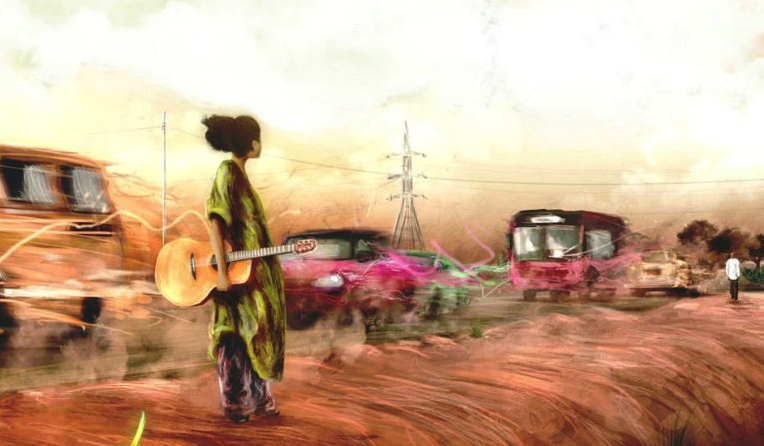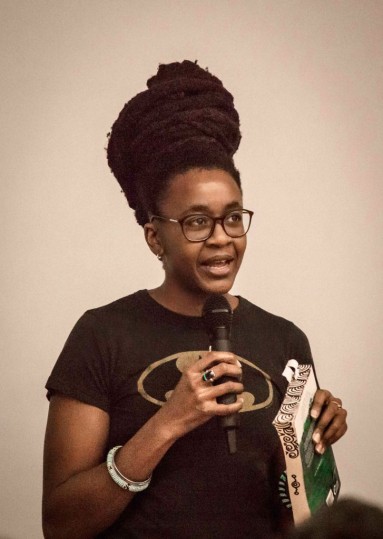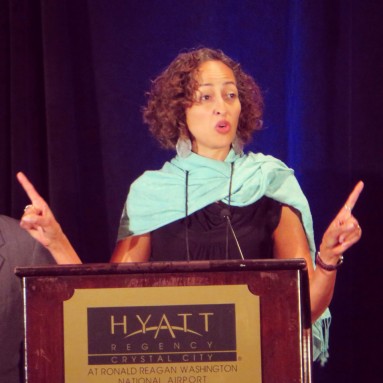The following conversation between Nnedi Okorafor and Sofia Samatar took place in front of a packed house at the University of Texas, on December 3rd, as part of the Symposium for African Writers. It has been edited for length; The transcript in full appears at Jalada. Before the panel discussion, Samatar read from her short story “Ogres of East Africa,” which can be found in the anthology Long Hidden: Speculative Fiction from the Margins of History. Okorafor read from her novel Lagoon.
Aaron Bady: One of the things that struck me, listening to the two of you read, was the way in which—whether we call it Afro-futurism, speculative fiction, science fiction, fantasy, it strikes me that these words are always opposed to realism. It’s always the thing that realism isn’t, or realism is the cudgel that’s used to beat on the legitimacy of the writing you do. But I’m thinking about how intensely realized this is, the attention to realistic details. If you know the archive of historical texts from the early colonial period in Kenya, “Ogres of East Africa” will strike you as intensely careful in its attention to “realistic” details. And Lagoon immerses us in Lagos, in a way that makes me wonder if maybe you don’t really know a city until it’s been hit by an alien meteorite.
Could you talk about realism, and how it relates to what you do?
Sofia Samatar: I think that anyone who thinks that fantasy and science fiction is in this vacuum, and it’s all made up, is lacking understanding not only of genre fiction, but actually of humans. You don’t conjure things up out of nothing. Everything is rooted in something. For me, at least, what’s great about fantasy and science fiction is that you’re often literalizing things that people talk about in metaphoric terms. But those things are realities.
So you can say, OK, let’s imagine an actual invasion, instead of just talking about “colonialism” in the abstract. It actually makes people’s real-world experiences clearer, or it makes them stand out in a different way.
Nnedi Okorafor: Agreed. And then, also, when we talk about “realism,” and, in particular, “African literature,” an interesting issue comes up, because in many African cultures, the idea of the mystical being part of the world—the mystical and the mundane being combined—is a natural thing. So, for me, writing something that was fantastical was natural to me. I never thought of it as “fantasy.” When I first started writing, I was writing memoir, and I was digging into my own past and writing about things that had happened to me, and the fantastical aspects of those stories naturally occurred there. I never thought, "I want to see magical things happen, I want to write magical metaphors." For some of us, it’s just the way we see the world. Also, the idea of separating science fiction from realism, it’s like separating the present from the past and the future. Those aren’t separated, those are all combined. I don’t see how you can look at science fiction and say, oh, that’s not realistic fiction.
I also quibble with the word “realistic fiction,” and “realism” to begin within. Because fiction is fiction. It just doesn’t make sense, and I think we should stop using it. I just came from a festival where someone was talking about science fiction and fantasy, but he kept saying “Well, I write realistic fiction,” like it’s up here and I was just making stuff up, and everything I write has no bearing on anything.
Fiction is all creation. It’s all creation in some way. Just because nothing strange happens in your story, nothing mystical happens in your story, that doesn’t mean that therefore it’s realistic. There’s a leap in logic there, in my opinion.
Aaron Bady: What about futurity? Would it be right to say that speculative fiction is all about imagining something — an alien invasion, for example — that we can’t imagine now, but then, neither could people in 1492? Putting a future into a narrative space that otherwise might be available? After all, so many of the traditional narratives about Africa are very historically rooted, oriented on the past, and a past that forecloses the future in lots of ways. I wonder if there’s something about the radical freedom of this kind of writing, where you’re imagining, that makes futurity possible?
Nnedi Okorafor: It’s interesting that you said that traditional African novels are based in history, and that African science fiction is free to do what it wants. I’m not sure if I agree with that. I think that when you’re imagining the future, the future has to be connected to the present and the past. I think that there’s freedom in science fiction, but there’s still—I don’t want to say “rules,” I don’t like rules—but there’s still logic and connections that are being made to things that have happened before. It’s imagining a future, but you’re taking it from somewhere, you’re looking at what’s happened and what’s happening, and you’re adding to that, you’re speculating about what will happen after that, so that connection is still there.
Sofia Samatar: I completely agree, and I think when we talk about Afro-futurism, in particular, it has “future” in the name, so people think of it as imagining the future. But Afro-futurist aesthetics, whether you’re talking about music, Sun-Ra back in the day, or whether you’re talking about something like Nnedi’s novel, Who Fears Death, yes, it is “futuristic,” but Afro-futurism has always been concerned with the past. Speaking particularly for Afro-futurism in its US-American incarnation, there’s always this idea of the traumatic break of the middle passage. How do you draw from the past in order to spring into the future? If you’re cut off from the past, you don’t have the materials to start imagining the future. It’s not like you can only talk about the future.
Nnedi Okorafor: I have a question! I’d like to know what you consider what you do. If it’s ever anything you think about when you’re writing. When you look at everything you’ve written, from short stories to novels, what do you say that you do? Do you have a name for it? Or do you have no name for it?
Sofia Samatar: I love the name “Speculative Fiction” because it’s so broad, that it’s just a big umbrella and you can stick a whole bunch of stuff under it. Whether it’s something that’s just kind of surreal, or whether it’s just… Actually, a lot of my stuff, like in most of “Ogres,” there’s no magic, it’s just people telling stories about these ogres. And it remains full of questions to the end, as to where the magic is, how much is magic, how much of the lives that we’re actually living are magic.
So, I like speculative fiction, because it lets me throw a whole bunch of stuff in there. But I do know that within the science fiction and fantasy community, there are people who will say “well this story was nominated for a Hugo award, but it’s not even science fiction!” So there are definitely these gate-keepers. But let me turn the question back!
Nnedi Okorafor: I say “speculative fiction.” But… I don’t want any category. I want to be open to write whatever I want. I don’t know if I necessarily am, but I know I’m pretty free. I’ve done very well in being able to jump from whatever category to combine things from another category and write whatever I want and not caring. But I can see myself in the future writing something that has no magical stuff in it, and I don’t know what that is, but I’m not going to call it “realism.” I could see myself writing something like that. I have those stories, I even have a title in my head.
I know that if I took that to my agent, he would say “what are you doing?” But I see myself writing memoir. I have written a memoir, I just haven’t had the guts to try to publish it yet. But when I wrote it, I was writing memoir and magic things still happened, because I wrote it. So I don’t know what to call that.
I know what I tell people when it’s convenient, I say that I write science fiction, or fantasy, or speculative fiction or whatever. But I don’t see myself as any of those; I see myself as all of those at the same time.
Sofia Samatar: That’s very recognizable to me as well. Switching gears a little bit: I actually have a question about the World Fantasy Award.
Nnedi Okorafor: Oh, lord.
Sofia Samatar: Did Chip Delany or Octavia Butler or any other writer of African descent, who is not sitting at this table, ever win the World Fantasy Award for best novel?
Nnedi Okorafor: No, it’s just us. In 32 years.
Sofia Samatar: In 32 years. I don’t know if people are aware, but there’s a bit of a controversy going on right now in the science fiction and especially fantasy community, because the World Fantasy Award, the actual award, the trophy that you get, is a statue of H.P. Lovecraft. It was chosen to honor his contributions to the literature of the imagination.
He was also a virulently racist writer, not only in his letters, but in his creative work as well. I actually first learned about this fact through your blog post, Nnedi, so could you say a little bit about how that post came to be written?
Nnedi Okorafor: OK, so I had won the World Fantasy Award. I wasn’t there for the ceremony, so this thing was sent to me in the mail, and it was… the head of Lovecraft. I…
At the time, I knew of his racism and anti-Semitism, I knew of it, but I didn’t know the depth of it. I learned the depth of it in the most annoying way: I was showing off the bust to my ex-husband, and he looks at it and said “That’s H.P. Lovecraft! Let me show you something.”
He went on to show me a poem that Lovecraft had written which really demonstrated exactly the depth of this man’s dislike of black people. It was called… What was it called?
Sofia Samatar: It was called “On the Creation of Niggers.”
Nnedi Okorafor: So I read this poem, and as soon as I read it, I knew I was in a position where, OK, I can’t get this and not say something, it would be wrong, I have to say something. So I wrote this blog post, kind of pointing out, in a very polite way, what was wrong with me winning this award and then getting a bust of this man.
I basically said that it’s difficult, because—as a person of color—it’s difficult to learn that some of the writers that you looked up to, hated you. So I wrote this blog post, and when I posted it, it became a very well-read bit of text. It kind of started this conversation about this bust, about H.P. Lovecraft. And that conversation got very heated, because you had the people who were defending having that bust as the award, and then you had the people who were siding with me. That went on for about a year, and then a year later, the awards came around again and nothing had changed. And then… Do you want to continue the story?
Sofia Samatar: Fast forward to last month: I was up for the World Fantasy Award for best novel. So I went to DC, to the convention, and I won. This is now, they have had three years to do something about this, and nobody did. So that meant that I became the first person to address the issue on the stage of the convention, at my first time to be at the convention.
Nnedi and I actually had a conversation over lunch, about the burdens that you take on, when you’re the one who can’t not say something. Because everybody else goes up on stage, all those white writers can go up and they just accept the award, and they’re happy. And you’re sitting there, and your guts are twisting, you’re in a panic that you’re going to have to go up on the stage and say this. But I didn’t feel like I had a choice.
We’ll see what happens.
Nnedi Okorafor: Something better happen.
Sofia Samatar: They need to change that award.
Audience member: What did you say?
Sofia Samatar: I said…. So, you know when you give people a writing critique? Where you start out, and you’re nice, nice, nice, and then you put a little thing in the middle, and then at the end, you make it nice again? I started by thanking the board. But then I said, look, I’m not going to get down without addressing the elephant in the room, here, which is how incredibly awkward it is for a writer of color to accept this award. We all know it’s ugly, I said. And that’s the thing! Everybody knows! And nobody says!
So I said that I was just going to put that out there. There had been noises out there, indicating that the board was aware of the controversy. Not that they were going to do anything about it, but just that they were aware. So I said, I’m glad you’re aware. And I hope the board takes this seriously.
Then I went back to being nice.
Audience question: I noticed the word “imagination” coming up a lot, and that might be a quality that gets talked about more in speculative, fantasy, and science fiction than in realist fiction. I wonder if you feel like there’s a difference in the way it operates in speculative fiction than in realist fiction?
Sofia Samatar: That’s a really interesting question. I’m actually writing something now that’s not genre fiction, and doesn’t have those markers. It’s about a trek of Mennonites from Uzbekistan in the 1880’s. And what do I know about 1880’s Uzbekistan? If we’re talking about the process of imagining my way into the characters, really, the biggest difference is that when I wrote my novel A Stranger of Olondria, for example, where I made everything up, the whole world, all the cultures, I had those markers, of food, of architecture, whatever it is and I made them up and then I stuck to them. Whereas in this case, I do research, and then I have to stick with whatever I found in research. These are not such different processes.
I always think that what we call “world-building” in science fiction and fantasy is really what you call “research,” if you’re not doing science fiction and fantasy. It’s that background work. But in both cases, I think, the imagination is active, and I would say, for me, it feels like it’s active in the same way.
Audience question: I have a question about how the American reception of Afro-futurism, or speculative fiction, differs from the reception in other parts of the world?
Nnedi Okorafor: Especially with Afro-futurism, one of the things I’ve always had a problem with is that when Afro-futurism is discussed, it is often discussed from a very American point of view. The roots are American, African-American in particular. But I think that’s very limited. Those who are outside the United States, who have a different experience, they experience Afro-futurism in a different way. They don’t see it as being rooted in the United States. That’s the way I see it. I wish that it would be seen more from that standpoint. To see it as just an American phenomenon, as rooted in African-American art, as a whole, is problematic. That’s a conversation that hasn’t been had yet.
Sofia Samatar: However! There will be a place where it will be had—or in which you can see it being had—because Jalada, which is a Nairobi-based and online magazine… Is it based in Nairobi? Most of the editors are there.
It’s on the internet. It calls itself a pan-African writers collective. There’s currently in process an issue on Afro-futures, and I’m one of the guest editors, and it’s exciting to see, because the majority of the writers we’ve received stories about are based in Africa, though there are also some African diaspora writers involved. I think that once we get ourselves in gear and get the issue out, it’s going to be very exciting. I think it’s something that going to be very important as an intervention in the discourse on Afro-futurism, because it’s very much coming from the African perspective.
Audience question: I don’t have a vested interest in terms, but it seems to me that one of the terms that Afro-futurism or science fiction needs to think about—or that I need to think about—is “Magical Realism”. “Magical Realism” becomes this thing that defines writing from the third world, in all sorts of ways that we all find unattractive. I think it’s a limiting category, because people like Gunter Grass don’t count, even though they formally look like it. But I’d like to ask how you know that what you’re doing isn’t that?
Sofia Samatar: I know it’s not magic realism because I don’t really believe in magic realism as a category. Because, as you’ve indicated, when you press on that category a little bit, it rapidly becomes “speculative fiction by brown people.” I just don’t see that as a viable category that you can base things on.
I’m teaching a class right now called Weird World Fiction, which is fantasy and science fiction from around the world, and that was one of the very interesting discussions we had: “What is magic realism, and does it exist?” I find it a very fragile category. If you just go like that to it, it kind of collapses.
But I don’t know, it has such an institutional life to it; in terms of literary establishments, it does have a life, and I’m being a little bit dismissive. So even though I think it isn’t really viable, maybe Nnedi will not be so dismissive of it, because it does have a life to it.
Nnedi Okorafor: “Magical realism” is so tricky. I’ve had to use that word to get past a lot of things. When I did my PhD, they told me I couldn’t write science fiction or fantasy, so I called it “Magical Realism” and that was okay.
I understand the issues around magical realism, but there’s one thing that I still can’t resolve. When you have writers of color who are writing from their cultures, and incorporating cultural beliefs into their works, into their worlds, is that fantasy? Those are the things that make magical realism need to exist as a separate category. It’s complicated. I look at Ben Okri’s Famished Road and he’s incorporating a lot of cultural beliefs, and then he’s got fairies in there, mixed in it.
It’s complicated. I can’t fully dismiss magical realism because of that aspect of it, because most magical realist writers are incorporating the mystical aspects of their culture into their works, and that’s different than fantasy. Even though the line becomes blurry.
As for the African roots of Afro-futurism, when you think of science fiction, that’s a form of writing that’s very Western. The pioneers of it would be in the West; that’s why you have Octavia Butler and Samuel Delany, and then, in terms of music, Western musicians like P-Funk and Sun-Ra. So there’s that, it’s a Western form of writing, and science fiction has to come to Africa in that regard.
But I’ve always believed that the idea of science fiction is just speculating about the future, and imagining. So when “Africa”—I keep saying “Africa,” and I hate saying that, because Africa’s not a country. But in the interest of time, I’ll just say Africa—I believe that when Africans start writing science fiction, from the continent, I like to believe that they write from their own roots, rather than imitating what’s already out there. If that makes sense. And so, the roots would not necessarily be American. They could be the Dogon who were stargazing and speculating and speculating about aliens…
Sofia Samatar: A great example would be the role of Amos Tutuola’s The Palmwine Drinkard in Nnedi’s book Who Fears Death. In a far future, that book has become a sacred text for these futuristic African societies. That, to me, is an example of things to come.



